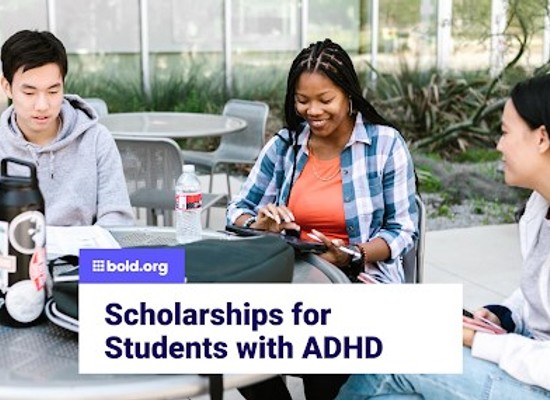
Unlocking Potential: My Journey Through Scholarships for Students with ADHD
I remember staring at the college application forms, a mountain of paper that seemed to mock my every intention. My mind, a bustling marketplace of ideas, often struggled with the mundane, the structured, the seemingly endless checklists. For years, my ADHD had been a quiet companion, sometimes a helpful jester, sometimes a relentless saboteur. But now, as I dreamt of higher education, it felt like an insurmountable barrier, not just academically, but financially. My parents, bless their hearts, worked tirelessly, but the cost of tuition, books, and living seemed astronomical. That’s when the whisper started, a tiny flicker of hope in the back of my mind: scholarships. Could there really be scholarships for students with ADHD? For someone like me, whose brain often danced to a different rhythm?
My journey into finding financial aid for college with ADHD was less of a straight path and more of a winding trail through a dense forest. Initially, I felt lost. All I knew was that I needed help, and I knew my ADHD presented unique challenges that sometimes made traditional learning environments feel like trying to catch water with a sieve. What I soon discovered, though, was that these very challenges often came hand-in-hand with incredible strengths – strengths that many organizations recognized and wanted to foster.
The first step, for me, was admitting I needed help, and then actively looking for it. I started with broad searches, typing things like "college scholarships" into search engines. But quickly, I refined my approach. I added keywords: "scholarships for ADHD students," "financial aid neurodiversity," "grants for learning differences." And that’s when the forest started to thin, revealing clearer paths.
What I learned was that many organizations understand that neurodiverse students, including those with ADHD, bring a unique perspective to the table. Our brains are wired differently, and that difference can manifest as incredible creativity, innovative problem-solving, a capacity for hyperfocus on subjects we love, and an unparalleled ability to think outside the box. These aren’t just quirks; they are valuable assets that colleges and employers are increasingly seeking out. So, my initial fear that my ADHD would be seen as a deficit quickly transformed into an understanding that it could actually be a significant part of my narrative, a strength to highlight.
One of the most encouraging discoveries was the existence of specific scholarships for students with disabilities, and within that umbrella, those specifically targeting learning differences like ADHD. These aren’t just a handful of awards; they are offered by various foundations, advocacy groups, and even some universities themselves. For example, I came across organizations like the Anne Ford and Allegra Ford Thomas Scholarship, which specifically supports students with learning disabilities. While I didn’t personally apply for that one, seeing its existence was like a beacon, showing me that there were indeed people and institutions who believed in the potential of students like me.
Then there are the general disability scholarships. Many foundations offer support to students who document a disability, and ADHD, when professionally diagnosed, often qualifies. This opened up a whole new avenue. It meant I wasn’t just looking for "ADHD scholarships," but also "disability scholarships," which significantly broadened my search. It was about reframing my diagnosis not as a barrier, but as a recognized aspect of my identity that qualified me for specific support designed to level the playing field.
Beyond these specific categories, I also looked into institutional scholarships. Many universities have their own pots of money, some of which are earmarked for students who demonstrate specific needs or come from underrepresented groups, including those with learning differences. My advice here, from my own experience, is to always check with the financial aid office of every college you’re interested in. Don’t assume they don’t have something. Sometimes, there are unpublicized funds or specific programs you only learn about by asking. I found that a direct, polite email or phone call often yielded more information than just browsing their website.
Local community organizations were another goldmine. My hometown had several civic groups, women’s clubs, and even local businesses that offered small scholarships to graduating seniors. These are often less competitive than national awards, and they value community involvement and local ties. While they might not cover an entire tuition bill, a few hundred or a thousand dollars here and there can quickly add up, making a real difference in covering books, supplies, or even a laptop that can help with organization. I remember applying for one from a local rotary club, highlighting how my volunteer work, despite my organizational challenges, taught me resilience and adaptability – skills often honed by navigating the world with ADHD.
The application process itself was, predictably, a challenge for my ADHD brain. Long forms, essay prompts that required sustained focus, and strict deadlines could feel overwhelming. I learned early on that I couldn’t just sit down and tackle everything in one go. That approach invariably led to procrastination, frustration, and often, missed opportunities.
So, I developed a strategy, one that felt more aligned with how my brain worked. I broke down each application into tiny, manageable steps. First, I’d just read through the entire application, making a mental note of what was needed. Then, I’d tackle the easy parts: my name, address, basic demographic information. Next, I’d gather supporting documents like transcripts and letters of recommendation. For the essays, which were often the most daunting part, I’d brainstorm ideas in short bursts. I’d set a timer for 15 minutes, jot down everything that came to mind about the prompt, and then walk away. I’d come back to it later, maybe the next day, and refine those ideas. This iterative process, rather than a single marathon session, worked wonders for me. It allowed my mind to wander and connect ideas in the background, making the writing feel more organic and less like pulling teeth.
When writing the essays, I made a conscious decision not to hide my ADHD. Instead, I chose to embrace it as part of my story. I didn’t frame it as a sob story or an excuse, but as a significant influence on who I am and how I approach the world. I talked about specific instances where my ADHD made things difficult – perhaps struggling with time management on a group project, or the sheer effort it took to stay focused during a particularly dry lecture. But then, I always pivoted to how I overcame those challenges, what strategies I developed, and what unique insights my brain wiring offered. For example, I might describe how my tendency to connect seemingly disparate ideas led to an innovative solution for a school project, or how my hyperfocus allowed me to dive deep into a subject I loved, far beyond what was required. I highlighted my resilience, my creativity, and my ability to adapt – all strengths that often emerge from navigating the world with ADHD.
One essay question asked about a time I failed and what I learned from it. My initial instinct was to pick something conventional. But then I thought about all the times my ADHD had made me "fail" in small ways – forgetting an assignment, misplacing important papers, getting distracted during a crucial task. I chose to write about a time I completely underestimated the time needed for a research paper, leading to a frantic, last-minute effort. I didn’t dwell on the panic, but on the systematic approach I developed afterward: breaking down large tasks, using visual timers, and actively seeking out accountability partners. It wasn’t just about a grade; it was about learning to manage my own unique brain. I believe this honesty, coupled with a focus on growth and strategy, made my application stand out. It wasn’t just another student recounting an academic struggle; it was someone sharing their personal journey of self-discovery and resilience in the face of a neurodevelopmental difference.
Another crucial aspect was gathering stellar letters of recommendation. I made sure to ask teachers and mentors who truly knew me, not just academically, but as a person. I sought out those who had witnessed my growth, seen my unique strengths, and understood the effort I put in, even when it wasn’t immediately apparent. I specifically asked them to highlight my creativity, my enthusiasm for certain subjects, and my perseverance, even if they also touched on areas where I might need extra support. A well-rounded letter that acknowledged both my challenges and my triumphs was far more impactful than one that only painted a perfect, but incomplete, picture.
The waiting game was agonizing. After pouring my heart and soul into these applications, the silence was deafening. Every email notification sent a jolt of anxiety through me. But then, one afternoon, an email arrived with the subject line: "Congratulations!" My heart leaped. It was from a small regional foundation, offering me a scholarship specifically for students demonstrating academic potential despite learning differences. It wasn’t the biggest scholarship, but it was the first. And it felt like winning the lottery. That acceptance wasn’t just financial aid; it was validation. It was someone saying, "We see you. We believe in you. Your unique brain is valuable."
That first scholarship was a catalyst. It gave me the confidence to keep applying, to keep sharing my story. Soon after, another one came in from my chosen university, a grant specifically for neurodiverse students who had demonstrated self-advocacy and a commitment to their studies. Bit by bit, the financial burden began to lift.
Receiving these scholarships changed everything for me. It wasn’t just about the money, though that was a huge relief for my family. It was about the freedom it afforded me. I could focus more on my studies and less on worrying about how I would pay for them. It allowed me to purchase assistive technology that genuinely helped me organize my thoughts and manage my time more effectively – tools that, without the financial support, I might have had to forgo. It allowed me to consider living on campus, which provided a more structured environment that I knew would benefit my learning style.
More importantly, it shifted my perspective. I stopped seeing my ADHD as a personal failing or an obstacle that made me less capable. Instead, I began to view it as an integral part of my identity, one that had equipped me with a unique set of skills and a different way of seeing the world. The scholarships affirmed that my neurodiversity was not a hindrance to my potential, but simply a different path to achieving it.
For any student out there with ADHD who is feeling overwhelmed by the prospect of college costs, my biggest piece of advice is this: don’t give up. The resources are out there. Start your search early. Be thorough, but also be kind to yourself in the process. Break down the application tasks into tiny steps. Use every tool at your disposal – timers, reminders, accountability partners. And most importantly, tell your story. Don’t shy away from your ADHD. Embrace it. Explain how it shapes your perspective, how you’ve learned to navigate its challenges, and how it has equipped you with unique strengths that make you a valuable addition to any academic community.
Remember, you are not alone. There is a growing understanding and appreciation for neurodiversity in educational institutions and society at large. Your journey, your perspective, and your potential are incredibly valuable. These scholarships aren’t charity; they are investments in brilliant minds that simply need the right support to flourish. My journey proved that with a little persistence, a lot of self-advocacy, and the courage to share my authentic self, the dream of higher education wasn’t just possible, it was within reach. And yours is too. Keep searching, keep believing, and keep shining your unique light. The world is waiting for what you have to offer.


